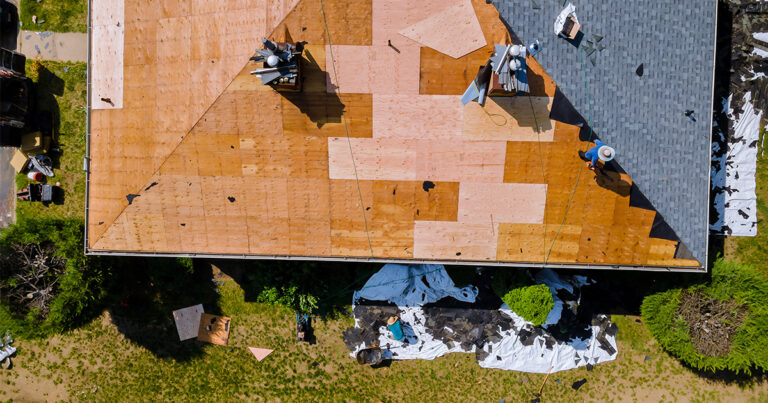Investing in Solar: The Advantages for Florida Homeowners
Florida, known as the Sunshine State, boasts stunning weather, sandy beaches, and a lively culture. With over 230 sun-filled days per year, it’s not surprising
FL License No. CCC1334089/CGC1532627
(Available 24/7)

If you’ve been thinking about replacing your roof, it’s important to consider how the right roofing contractor can help make your new roof project a success. A lot of homeowners have the same concerns when contemplating if they should get a new roof. Here are some of the most common questions we get from homeowners who are considering replacing their roofs.
You can tell if you need a new roof by noticing leaks, missing shingles, broken shingles and curling shingles.
A new roof can provide several benefits, including:
Newer materials also tend to have much better soundproofing qualities than those used on older homes which means less noise from outside sources like traffic nearby during busy times like rush hour periods too!
You should choose a contractor who is licensed, has a good reputation, and provides references. Here are some other things to consider:
As you begin to learn about new roof options, the first thing to do is decide what kind of roof you want. There are many different types of roofs that can be used on a home, each with its own advantages and disadvantages.
The most common types of roofs include shingle, tile, and metal. Each has their own warranty term/duration and will require differing amounts of upkeep over time. For example:
The first thing you need to do is have your roof inspected by an expert. This will help you determine if your roof needs replacing or not.
If you are replacing an existing roof, it’s important to remove any debris from the old one and clean out your gutters before installation. If there is standing water on top of the old shingles, this can cause mold growth underneath which could result in leaks once the new roof goes up.
Make sure that your home is structurally sound enough for the new installation by checking for any signs of leaks or damage caused by previous weather events such as hurricanes, tornadoes, etc..
You also want to make sure that insulation is properly installed underlayment boards so that heat does not get lost through any gaps between them and outer layers like flashing tape (which prevents water getting through cracks between materials).
It’s hard to give a precise answer because every roof is different. In general, you can expect your roof to last at least 20 years and sometimes even longer depending on the quality of your roofing material, how well it’s installed and how well it fits with the structure of your home. Newer homes typically have better-quality roofs than older homes. They also tend to be built with more durable materials that will be able to withstand harsh weather conditions such as rain or snowfall. Colder climates generally result in tougher building materials while warmer climates mean they don’t need as much strength from their roofs. Finally, dry climates generally mean fewer problems installing a new shingle than those that experience frequent rainfall or high winds—which would cause wear and tear on a typical asphalt shingle much faster than other types of materials (like metal).
It’s important to remember that your roof is your home’s first line of defense against the elements. So when it’s time to replace it, it’s a decision you should feel comfortable with. The best way to be sure you’re getting what you paid for is by having an expert assess the property before making any decisions.
When looking for a new roofing contractor, there are several things we recommend checking off your list:
A new roof provides peace of mind and an assurance that your home is protected from the elements. We hope you found this article helpful in answering some of the common questions people have about replacing their roofs. If you find yourself still having questions, we encourage you to contact us directly at 941-462-4026 or visit us online for more information!
Florida, known as the Sunshine State, boasts stunning weather, sandy beaches, and a lively culture. With over 230 sun-filled days per year, it’s not surprising
Residing on Florida’s picturesque Gulf Coast offers the perfect combination of sun-soaked days, sandy beaches, and a relaxed lifestyle. However, this region is also susceptible
Residing along the Gulf Coast of Florida presents a unique set of challenges, including scorching heat, high humidity, and the ever-present danger of hurricanes and
Copyright © 2025 Nova Construction and Roofing.
Error: Contact form not found.
Error: Contact form not found.
Error: Contact form not found.
Error: Contact form not found.
Error: Contact form not found.
Error: Contact form not found.